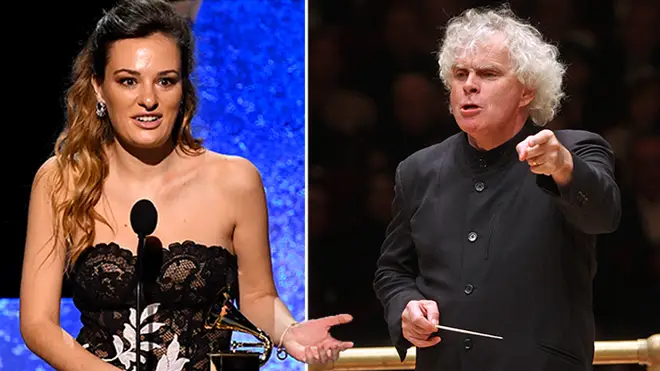On Air Now
Early Breakfast with Lucy Coward 4am - 6:30am
13 October 2020, 16:46 | Updated: 14 October 2020, 17:29

Violinists Nicola Benedetti and Tasmin Little, and the LSO, have penned a letter to Rishi Sunak, urging the chancellor to throw a lifeline to freelance musicians amid the pandemic.
Nicola Benedetti and Tasmin Little, two of Britain’s leading violinists, have signed an open letter to the chancellor Rishi Sunak, urging the government to up its support for freelance artists, who have been deeply affected by the repercussions of the coronavirus pandemic.
Signed by 1,200 musicians and industry organisations, including the London Symphony Orchestra, the letter voices its support for a new campaign by the Musicians’ Movement (MM) and Incorporated Society of Musicians (ISM), #MakeMusicWork.
It welcomes the recent funding for arts organisations, but urges the government to provide a “guaranteed minimum fee” for freelancers, as concert halls navigate the realities of social distancing and reduced ticket sales.
The signatories also ask for improved financial support for the swathes of musicians who have been unable to work since March, with venues closed due to COVID-19 safety restrictions.
“It is critical for this government to provide a viable route back to work, allowing musicians to both support their families and start contributing once again to our communities and national life,” a statement from the ISM says.
Read more: LSO and CBSO among arts institutions to receive £257m survival fund >

Let Music Live protest on London's Parliament Square
With their campaign, the MM and ISM hope to urge the government to “protect the tens of thousands of jobs at risk in the UK’s cultural sector”, an industry which contributes £10.8 billion a year to the UK economy.
During the pandemic, studies show nearly half of musicians have been forced to look for work outside the music industry, while more than a third do not have any work at all.
The letter’s signatories say they want to “kickstart the live music sector” while ensuring freelancers get paid a fair salary despite social distancing and reduced ticket sales.
They urge the chancellor to also make changes to the Self-Employment Income Support Scheme (SEISS), through which they say, “many musicians have already fallen through the gaps”. Currently, freelancers can claim a maximum of 20 percent of their average monthly salary. 45 percent of musicians are currently not covered by the scheme at all.
Most musicians also won’t be covered by the wage top-up scheme mentioned in the chancellor’s Winter Economy Plan, for which only employees working a third of their usual hours are eligible – meaning, industries still in shutdown or unable to employ workers over the coming months won’t receive any support.
Read more: Chancellor Rishi Sunak appears to suggest struggling musicians should get a new job >

Spem in alium, performed by the Ora Singers at the Tate Modern in London
“Our culture is the lifeblood of our nations and has an essential role to play in uniting our country,” the ISM’s statement continues. “Our work, and the work of our members and supporters has always been viable and will continue to be so for centuries to come.
“Without further support for our sector the UK will have lost much of the priceless cultural heritage that was built up over generations and replaced with a cultural wasteland with no industry to return to.”
The ISM’s comments echo recent frustrations expressed by musicians, that their jobs were not considered “viable” in the COVID-19 economy.
Tensions have since been building, following an interview in which the chancellor appeared to suggest musicians get another job, followed by a widely criticised government-backed campaign which suggested ballet dancers “retrain in cyber”.
Chi-chi Nwanoku OBE, founder of the Chineke! Foundation and Classic FM presenter, who has also added her name to the letter, said: “Freelance musicians have borne the brunt of the shutdown of the entertainment industry over the past seven months.
“We are in danger of a whole generation of talent being lost without the means or commitment to a solid recovery for the cultural industries.”